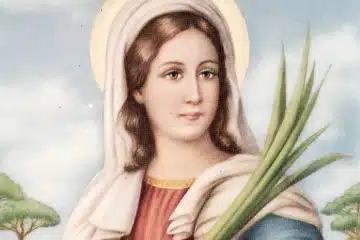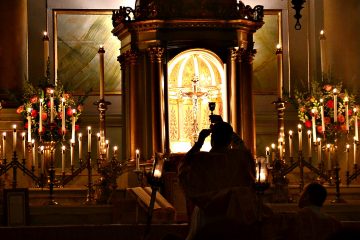Sunday Scripture: Lord, give us the strength of your salvation
March 29, 2011
By Sister Betty J. Lillie. SC
Third Sunday of Lent: Exodus 17:3-7; Psalm 95:1-2, 6-9; Romans 5:1-2, 5-8; John 4:5-42.
A theme of seeking water to drink when people suffered from thirst works through our liturgical reading for this week. In the time of the Exodus the water for which the people thirsted was the water necessary to sustain human life. Later, in the Samaritan encounter, the water was simultaneously the water for everyday human needs, but primarily the water that was the gift of God’s life in humankind, welling up to eternal life.
In the Exodus event everyone knew what kind of water was desired. The need was so pressing that the people became desperate for lack of it. They challenged the Lord to show that He was in their midst by satisfying their needs. The Lord did, in fact, give them water, but the places from which it came were named Massah and Meribah — names derived from the verb for “finding fault.” These stood as a testimony to Israel’s faithlessness and petulance.
The story of Jesus with the Samaritan woman was remarkable in several ways. The text presents Jesus speaking to non-Jews — a bold stroke of the universalism of His message. Also, Jesus held a conversation with a woman in a public place — a practice that departed from rabbinic custom. In these cases Jesus was breaking barriers that would open His message to a wider sector of society. He even stayed with the Samaritans for two days at their request, and many believed His words and knew that He was the Savior of the world (John 4:42).
The water of which Jesus spoke in the Samaritan encounter was Jesus’ gift of God’s life given to those who believed. It was what Jesus called “living water” (John 4:10). It was a spiritual gift of continuing life within believers that would well up unto eternal life. In that sense, they would not thirst again.
Jesus’ conversation about water gives an impression of a series of riddles. It gradually turned to include the place of worship — Samaria or Jerusalem. Jesus put that to rest by indicating that the place of worship was not the primary concern. What was important was worshiping the Lord in spirit and in truth — a faithful response to God’s gift of himself to them, and in accord to God’s grace to them to accept Christ’s divine identity. To put it very plainly Jesus said, “I who speak to you am He” (John 4:26). He claimed His Messianic identity.
In Paul’s Letter to the Romans we see that in the Christian tradition the teaching of Jesus came to full and clear expression. The apostle’s words are direct and to the point. Through our faith in Jesus Christ we have been given access to grace and we rejoice in our hope to share in the glory of God (Romans 5:1-2).
Our hope in God’s promises is not disappointing because God’s love has been poured into our hearts through the Holy Spirit given to us. Christ even went to the extent of giving His life for our redemption.
The psalmist calls us to turn away form the hardness of heart that was seen at Massah and Meribah, and to turn to the Lord with the joy of our salvation. O come, let us sing to the Lord with thanksgiving. Let us make a joyful noise to Him with songs of praise (Psalm 95).
Sister Betty Jane is a faculty member at the Athenaeum of Ohio.









